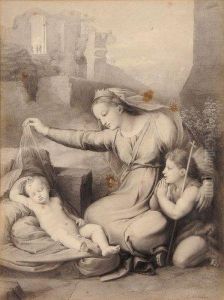Jean Baptiste Louis Massard Paintings
Jean Baptiste Louis Massard was born in 1740 in Paris, France, into an era that was rich in artistic evolution and cultural development. His life and career unfolded during a period marked by significant historical events, including the French Revolution and the Napoleonic Wars, contexts that inevitably influenced the arts and artists of his time. Massard was primarily known for his work as an engraver, a profession that held considerable importance in the dissemination of art and information during the 18th and early 19th centuries.
Massard's skills in engraving were largely self-taught, although it is known that he was deeply influenced by the works and techniques of earlier and contemporary engravers. He mastered the art of reproducing paintings and drawings, which made him a valuable contributor to the preservation and dissemination of artworks during his lifetime. His engravings included portraits, landscapes, and reproductions of historical and mythological paintings, showcasing his versatility and attention to detail.
Throughout his career, Massard collaborated with various artists and publishers, contributing to books, journals, and standalone pieces that celebrated French culture, history, and art. His works served not only as artistic expressions but also as educational tools, allowing broader access to the masterpieces of his time. Despite the challenges posed by the political and social upheavals of his era, Massard's commitment to his craft remained steadfast.
Jean Baptiste Louis Massard passed away in 1822, leaving behind a legacy etched in the rich tapestry of French art history. His contributions to the field of engraving have been recognized for their precision, beauty, and historical value. Through his meticulous reproductions, Massard played a crucial role in the preservation of art and the promotion of cultural heritage, making his work an enduring part of France's artistic legacy.
